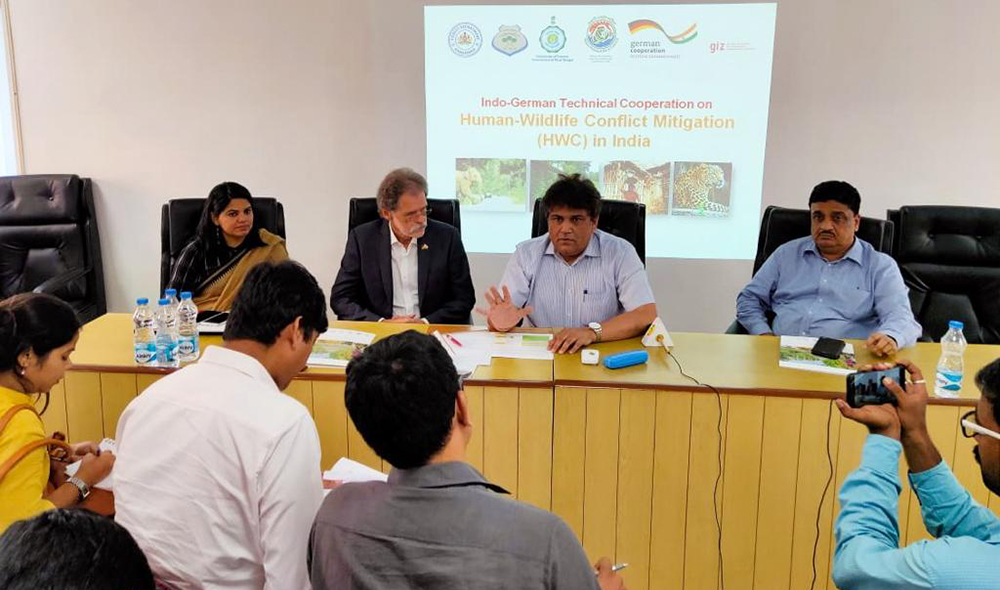04 Jul, 2019
One of the components on the Indo-German project on Human-Wildlife Conflict (HWC) Mitigation focuses on the “pilot application of newly developed instruments for the mitigation of human wildlife conflicts”. It has a specific work package on “pilot implementation of selected mitigation instruments in West Bengal” under which one of the prioritised instruments is “Early Warning and Rapid Response System”. To achieve this, the project had implemented trainings for the Rapid Response Teams (RRTs) at the project pilot sites and provided key equipment and vehicles for facilitating an efficient response from the RRTs. In this context, Project procured two TATA Xenon vehicles for the RRTs at the pilot site in West Bengal- the Gorumara Wildlife Division. The handing over ceremony of the vehicles took place on 4th July 2019 Thursday, at Bana Bhawan, Bidhan Nagar, Kolkata where the vehicles were handed over by the Ministry of Environment, Forest and Climate Change (MoEFCC) and GIZ, to the West Bengal Forest Department.


The officers and experts from MoEFCC, GIZ and West Bengal Forest Department participated in the event and shared their views on the issue of human-wildlife conflict mitigation in India and capacity development of the Rapid Response Teams at Gorumara. Shri. Soumitra Dasgupta, Inspector General of Forests (Wildlife), MoEFCC, Government of India, Dr Konrad Uebelhoer, Director, Indo-German Biodiversity Programme, GIZ and Dr Neeraj Khera, Team Leader, HWC Mitigation Project handed over the keys to Shri. Siddhartha Barari, Principal Chief Conservator of Forests & Head of Forest Force (HOFF) West Bengal Forest Department. Dr Subrat Mukherjee, PCCF CAMPA, Shri. Piar Chand, APCCF & Director, Sundarban Biosphere Reserve, Dr Subhadeep Bhattacharjee, Technical Expert, HWC Project, GIZ and officials from the West Bengal Forest Department (Shri. S. Sasikumar an Shri. S. S. Anand) were present at the occasion.
Dr Uebelhoer provided an overview of the Indo-German cooperation in India and the key features of the technical cooperation projects. Shri. Dasgupta stated the timely and critical nature of such a technical cooperation project for India, where human-wildlife conflict is not only a conservation issue, but a development issue as well. This is evident from the fact that the majority of the questions raised in the parliament this year are related to the issue. He also stressed on the unique nature of the Indo-German project; that it is facilitating exchange of knowledge and experiences across states, sectors and stakeholders in India as well with other countries. Dr Khera provided an overview of the Indo-German HWC Mitigation in India project and updated the group on the implementation measures of the project. She presented the conceptual plan of the early warning and rapid response system at the three pilot sites in Karnataka, Uttarakhand and West Bengal, and spoke about how this system will contribute to the database on HWC in India.
.jpeg)
Shri. Mukherjee expressed his satisfaction on the approach of the Indo-German project to find solutions for human-wildlife conflict in West Bengal. Shri. Barari appreciated the capacity development approach of the project where it supported the integration of the HWC module in the certificate and Diploma courses in Wildlife Institute of India (WII) and in the State Forest Service (SFS) courses in the Central Academy for State Forest Service (CASFOS) Dehradun. He expressed his expectation on having a similar training for West Bengal SFS and frontline officers in their induction course and appreciated the project’s work on the development of Standard Operating Procedures (SOPs) and on the early-warning and rapid response. Shri. Barari said that the vehicle support by the Indo-German Technical cooperation project will immensely help in improving the movement and rapid response of the Wildlife Squads in Gorumara Wildlife Division and mitigating human-wildlife conflict in the adjoining Landscape in North Bengal.
© 2014 IGBP. All Rights Reserved.
Site By: Virtualpages
